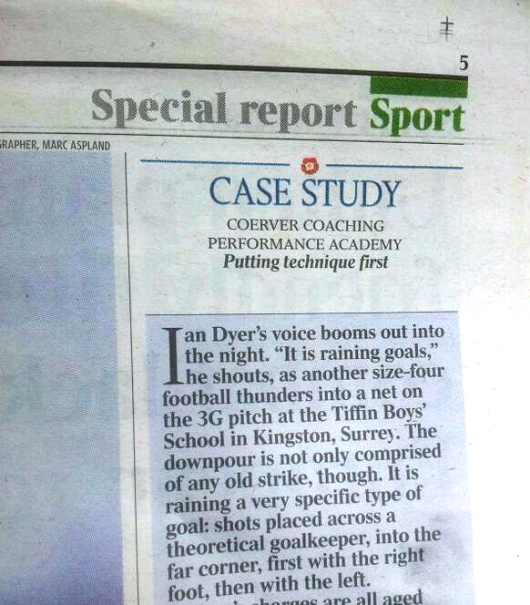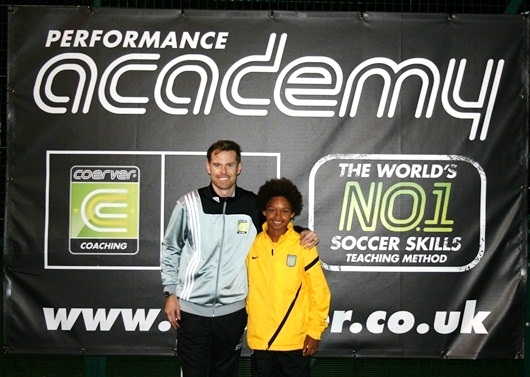During the last week, National newspaper of the year, The Times, has published a five part research into youth development in the UK. The research posed three main questions and formed the basis of the feature:
How we can best nurture our talent in this country?.
How we can best utilise our academies?.
How can we channel football’s wealth back into grassroots?.
The Times award winning team of journalists; Matt Dickinson, Oliver Kay, Matt Hughes and Rory Smith have travelled around the country to research the feature which is titled “For The Good Of The Game”.
Times sports journalist Rory Smith visited the Coerver® Coaching Performance Academy in West London which was featured as a case study in Part three of the published series on Saturday 1st March 2014.
The Times, Saturday 1st March 2014, “For The Good Of The Game Part 3” by Rory Smith
Ian Dyer’s voice booms out into the night. “It is raining goals,” he shouts, as another size four football thunders into a net on the 3G pitch at the Tiffin Boys’ School in Kingston, Surrey. The downpour is not only compromised of any old strike, though. It is raining a very specific type of goal: shots places across a theoretical goalkeeper, into the far corner, first with the right foot, then with the left.
Dyer’s charges are all aged between 8 and 11, and they are part of the Coerver Coaching Performance Academy. About 30 are taking part in this 90-minute session and another couple of dozen, slightly older, will follow them later in the evening. All told, there is something in the region of a thousand children in the United Kingdom learning football the Coerver way.
The core component, as laid down by Wiel Coerver, the movement’s founder, is on technique; what they call ball mastery. “Skill is the foundation for everything,” Amit Sohal, Coerver’s regional director in West London, says.
The system – briefly – works as a set curriculum. Each module – ball mastery, one against one, speed, finishing – lasts six or seven weeks. Each builds on what went before and each becomes more difficult, Everything is done with both feet, and almost everything with the ball.
Every week the children are given a new “move” to learn at home – a feint, or a ball technique – before refining it under the watchful eye of a coach. It is broken down into its constituent parts, practised in isolation and then in situations of increasing pressure.
At the end of every session, the children give feedback, explaining what they have just learnt. There are twice-yearly evaluations and half-term camps; parents and children alike can track their progress online.
If it all sounds new-fangled, it isn’t: Coerver is celebrating its 30th anniversary. Arjen Robben, is the most famous product of the system, but Peter Crouch and Daniel Sturridge both have some experience of it too.
Gerard Houllier attributed the growth of France’s golden generation to the adoption at Clairefontaine of some Coerver principles. In Japan, 18,000 children are enrolled and some 350 professional players owe their careers, in part, to it, after its wholesale introduction in the 1990.
“There is greater emphasis on precise technical ability here than in professional academies, I think,” Dyer says “Here, we think only about development”.
Coerver® Coaching UK Director, Scott Wright, added “It is great that such a respected publication as the Times wanted to feature our Performance Academy programme within their research into youth development in the UK”.
“The initial concept behind our Performance Academy programme was to provide professional grade support to all young players that want to learn. We wanted to bridge the gap between grassroots football and professional academy football with this programme and it has proved to be highly successful since it’s launch six years ago”.
“There are various levels within the programme that cater for the individual needs of the players that are with us. We have players that want to be better within their grassroots environment, we also have grassroots players that may have the potential to step up to academy football”.
“We also work with academy players that have been released and want to get back into that environment and we also have current academy players that want additional specialist technical training”.
“Although we have many individual needs to cater for within our Performance Academy, the focus of our development programme is the same for all players. We want to develop confident, skilful, creative players and we want to make the game fun to practice and play”.
“Over time with lots of hard work, dedication and expert teaching, our aim is to develop players who are are masters of the ball with both feet and have the ability to perform all of the skills that we work on effectively in the game at speed, under pressure and in tight spaces both individually and in small groups”.
Scott (below image with Matty H, Performance Academy player being signed by Aston Villa FC) added “Our focus is different to that of a team based environment, we don’t run teams, we are improving the individual for the team that they play for, like personal training for football”.
“This is the difference between our programme and other programmes out there, we are all about developing the individual and providing what they need at any given point in time to maximise their development potential”.
“As well as being responsible for developing each player’s skill on the pitch, we are equally committed and in our view responsible to assist in their development as people. Instilling a hard work ethic, confidence, self-responsibility, communication, team work, and respect are all areas that we look to encourage within our environment which are all applicable to football but also away from football”.
“This is delivered through “The Coerver Code” which provides a structure to our development programme both on and off the pitch and is something that Coerver Coaching founders, Alf Galustian & Charlie Cooke are very passionate about in terms of not only developing football skills but life skills as well”.
“So Performance Academy is not just football training, we view it as a football education programme that looks to develop the whole player/person and we believe that our programme can have a big impact on youth development here in the UK, now and in the future”.







